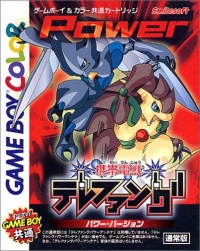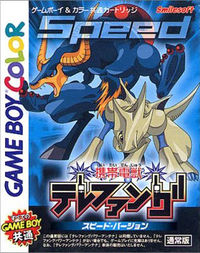Telefang 1
| Keitai Denjuu Telefang 携帯電獣テレファング Keitai Denjuu Terefangu | |
  
| |
| Series | Keitai Denjuu Telefang |
|---|---|
| Versions | Power and Speed |
| Developer(s) | Natsume |
| Publisher(s) | Smilesoft |
| Designer(s) | Saiko Takaki |
| Release date | 3 November 2000 |
| Genre | Console role-playing game |
| Platform | Game Boy Color |
- For the GBA sequel to Keitai Denjuu Telefang, see Telefang 2.
- For the Keitai Denjuu Telefang series of games, see Keitai Denjuu Telefang (series).
Keitai Denjuu Telefang (Japanese: 携帯電獣テレファング, Keitai Denjuu Terefangu), also known as Telefang 1 (since there are two games in this series), is a video game for Game Boy Color, developed by Natsume and published by Smilesoft in Japan. It is available in two versions, Power and Speed. Limited-edition versions of the game included a peripheral called the Power Antenna.
The game was never released in English, and is best known among English audiences for the bootlegged versions, Pokémon Diamond and Jade, which were hacked and sold as fake Pokémon games.
Plot[edit]
In the year 2020 it has become possible to travel to the Denjuu World using D-Shots, special mobile phones. Making friends and sharing telephone numbers with Denjuu has become popular among humans.
The protagonist, Shigeki, despite having originally arrived in the Denjuu World by accident, becomes determined to travel the world with his new Denjuu companion, and make more new friends while he is there.
Gameplay[edit]
Telefang is a monster-collecting RPG with monsters known as Denjuu that live in a world called the Denjuu World. These Denjuu have cellphones called D-Shots and they battle each other. They can befriend T-Fangers, people who specialize in handling and befriending Denjuu and having them battle other Denjuu. Shigeki, the protagonist, is one such T-Fanger. When arriving to the Denjuu World, Shigeki is determined to befriend Denjuu to solve the various problems in the Denjuu World that crop up from time to time. Shigeki starts with the Denjuu Crypto in Power Version and Fungus in Speed Version, and from there, befriends and battles other Denjuu.
In a battle, a T-Fanger can have from one to three Denjuu to battle. They bring Denjuu by calling them. A T-Fanger will always have one Denjuu with them, but the other two have to be called in order to have them battle. The better the coverage on the T-Fanger's D-Shot, the more Denjuu they can use in battle. Also, depending on the T-Fanger's location, some Denjuu will be close by, but others will be so far away that they may take multiple turns to arrive. This can serve an important role in deciding which Denjuu to pick, and can be a tough decision to make when stronger Denjuu live farther away than weaker Denjuu. Also, Shigeki can see the opponent's Denjuu ahead of time, which can affect his decision on which Denjuu to use.
Each Denjuu has a certain habitat type (out of 6), which affects the damage done to other Denjuu. All of a Denjuu's moves are the same as their type. Depending on the matchup against another Denjuu, a Denjuu's attacks can do either greater damage than usual, or less damage than usual. The type matchups are a 6-way rock-paper-scissors chain: Forest > Aquatic > Desert > Grassland > Mountain > Sky > Forest. Due to the nature of 3-on-3 battles, a Denjuu can have a type that covers the weaknesses of a teammate's Denjuu, making some battles interesting.
Each Denjuu has a moveset from 2-4 moves, which expands as the Denjuu levels up. While the moves are fixed, they often change (and typically get more powerful) when they evolve. Each move can do various things, such as deal damage, raise a stat, inflict status conditions, heal, and so on. Also, the fourth move is always a Denma Attack -- this is a powerful move, and runs off the attacker's Denma Attack stat and the opponent's Denma Defense stat. However, the tradeoff is that takes many turns to charge up, which can mean that the Denjuu may be defeated before it gets fully charged. Also, it can miss, so when it does, there are many turns wasted. Finally, there are moves that some Denjuu have that evade attacks, including Denma Attacks, which can also mean many turns wasted. This adds strategy in whether Denma Attacks are good to use or not.
Each Denjuu can evolve in different ways, with complex evolution chains. The most common method is natural evolution, which takes place when a Denjuu reaches a certain level. This takes longer than the other two methods, but is usually the best stat-wise. Another method is fusion evolution, a method that fuses Denjuu with manmade items. While many Denjuu can evolve with this method (and in fact, some Denjuu can only evolve this way), and it is the quickest method, it is generally the worst stat-wise. The last method is lab evolution. These Denjuu evolve from DNA samples from a specific set of Denjuu, and often Denjuu that evolve with this method don't evolve naturally. It tends to be better stat-wise than fusion evolution.
Outside of battles and Denjuu, each area has some problem that has to be solved, such as by beating certain bosses along the way. Some areas involve talking to other people and Denjuu, while others have complex and long mazes that must be navigated.
Characters[edit]
Humans[edit]
- Main article: List of people
- Shigeki (Japanese: シゲキ; Bootleg: Bek) - The protagonist of Telefang 1.
- Matsukiyo (Japanese: マツキヨ; Bootleg: Sungki) - A child genius who wants to learn more about the Denjuu World. He accidentally gets transported there along with Shigeki.
- Miyo (Japanese: ミヨ; Bootleg: Miyor) - A strong-willed girl described as a childhood friend of Shigeki, but teases him about never having been to the Denjuu World. Her Denjuu partner is Suguri.
- Kai (Japanese: カイ; Bootleg: Boundary / Ken / Kate) - A mysterious boy encountered during Shigeki's travels, his purpose in the Denjuu World is unclear. In the Power Version, his partner is Angios, while in Speed Version it is Gymnos.
- Sanaeba (Japanese: サナエバ; Bootleg: Sanarba) - The owner of Sanaeba Pharmaceutical Company, which was the first to discover the Denjuu World. After their discovery they began to branch their business into other areas, and they control the human-to-Denjuu World gates. While children are allowed in and out for free, adults must pay a fee. Sanaeba seems to have his name attached to many of the problems which have cropped up in the Denjuu World, and is apparently manipulating Denjuu for unknown reasons.
- Nerikara (Japanese: ネリカラ; Bootleg: Mr. Nerikara) - The leader of the Kakuza Party, who tries to get people to vote him for prime minister of the Denjuu World by promising to set up a curry store. The Denjuu seem to have a positive response towards curry.
- Tabasco (Japanese: タバスコ; Bootleg: Tabasuko) - Nerikara's partner, a Kakuza Party member. Because Nerikara doesn't know how to use a D-Shot, she does his battling for him.
Denjuu[edit]
- Crypto (Japanese: クリプト)- A strong Denjuu with a hot-tempered personality. It is assigned by Musa as Shigeki's first partner in the Power Version.
- Fungus (Japanese: ファンガス)- A swift Denjuu with a faithful personality. It is assigned by Musa as Shigeki's first partner in the Speed Version.
- Musa (Japanese: ムサ) - An old, turtle-like Denjuu who is the first to greet Shigeki and Matsukiyo after they arrive in the Denjuu World. He asks for their help with various problems that the Denjuu World is suffering, and introduces Shigeki to his first partner.
- Angios/Gymnos (Japanese: アンヂオス / ヂムノス)- Partners of Kai (Angios in Power Version and Gymnos in Speed Version).
Power and Speed version differences[edit]
The two versions, Power and Speed, have some differences:
- The starter Denjuu that the player is given at the beginning of the game is different, with Crypto for the Power version and Fungus for the Speed version.
- The rival Denjuu which Kai uses is different, with Angios for the Power version and Gymnos for the Speed version.
- There are some Denjuu that can only be found in each version.
- There are some colour differences between the two, such as the colour of the D-Shot menu.
- The order of houses to visit for the puzzle in Panses Village differs between versions.
- The directions to navigate Ixos Forest are slightly different in each version.
- Levels of wild Denjuu in Bryon Ruins differ somewhat between versions on floors 1-6.
Manga[edit]
- Main article: Telefang 1 manga
A manga series based on Telefang 1 was created and was serialized in Comic Bom Bom from March 2000 to July 2001. It was later released in 3 volumes, which are still available secondhand from online stores such as Yahoo! Japan Auctions and Amazon Japan. It was never released in English.
Sequel[edit]
- Main article: Telefang 2
- Main article: Differences between Telefang 1 and Telefang 2
Smilesoft released a sequel to Telefang 1 for the Game Boy Advance, with new Denjuu and a slightly different style of battle, where the player can intervene in a middle of a battle to use items on the Denjuu. Move types were also introduced.
The graphics and music were updated with the move to Game Boy Advance, and many old Denjuu received improved sprites.
Bootlegs[edit]
- Main article: Pokémon Diamond and Jade
Keitai Denjuu Telefang was originally only available in Japanese. However, certain pirates in China bootlegged it under the name of Pokémon Diamond and Pokémon Jade. [1] The translation consisted of Engrish and certain profanities were also used. This resulted in a poor reception towards the game, leading many people to think it is a Pokémon ripoff.
The sprites and maps remain the same, changing only the text to English. The ability to name the character or the Denjuu was also not present, and the game would also not load a save properly. Many other glitches were also present.
Although the Pokémon Diamond and Jade games have gained notoriety among English audiences and are the most well known, many other bootlegs of the original Telefang games and various other translations of Pokémon Diamond and Jade, such as one in Chinese, exist. See also: Bootlegs of Telefang 1
See also[edit]
- Denjuu
- Telefang 2
- List of Denjuu in Telefang 1
- Pokémon Diamond and Jade
- Wikifang:Telefang 1 Walkthrough
References[edit]
- ↑ http://en.wikipedia.org/wiki/Keitai_Denjuu_Telefang. Accessed on 13 January 2008.
Tronco Village ・ Krinon Village ・ Iris ・ Palm Sea ・ Freesia ・ Barran ・ Ion Island ・ Paparouna Lake ・ Panses Village ・ Toulipa Village ・ Fraoula Village ・ Mt. Peperi ・ Ixos Forest ・ Cactos Ruins ・ Myces Lake ・ Bryon Ruins
Tronco Village Spring ・ Northeast Cavern ・ Craft Research Center ・ Dimenza's Mansion ・ Antenna Tree ・ Sanaeba Research Center